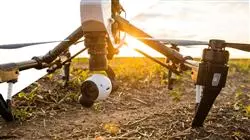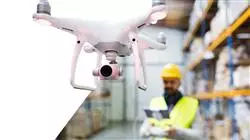University certificate
The world's largest faculty of engineering”
Introduction to the Program
Be the expert Robotics Engineer that every company wants to have in its team. Enroll now”

Specialize and succeed in the Robotics industry. Take the step and sign up’’
This Postgraduate diploma in Robot Visual Perception Systems with Machine Learning contains the most complete and up-to-date program on the market. The most important features include:
- Development of case studies presented by experts in robotic engineering
- The graphic, schematic, and practical contents with which they are created, provide scientific and practical information on the disciplines that are essential for
professional practice - Practical exercises where self-assessment can be used to improve learning
- Its special emphasis on innovative methodologies
- Theoretical lessons, questions to the expert, debate forums on controversial topics, and individual reflection assignments
- Content that is accessible from any fixed or portable device with an Internet connection
You have the opportunity to advance in a booming field. Enroll and perfect your knowledge in Artificial Intelligence”
The program’s teaching staff includes professionals from the sector who contribute their work experience to this educational program, as well as renowned specialists from leading societies and prestigious universities.
Its multimedia content, developed with the latest educational technology, will provide the professional with situated and contextual learning, i.e., a simulated environment that will provide an immersive education programmed to learn in real situations.
The design of this program focuses on Problem-Based Learning, by means of which the professionals must try to solve the different professional practice situations that are presented throughout the program. For this purpose, the student will be assisted by an innovative interactive video system created by renowned experts.
The multimedia resource library of this Postgraduate diploma provides you with a cutting-edge and highly useful content for your career"

Acquire learning that will lead to the optimal deployment of Neural Networks in Real Applications"
Why study at TECH?
TECH is the world’s largest online university. With an impressive catalog of more than 14,000 university programs available in 11 languages, it is positioned as a leader in employability, with a 99% job placement rate. In addition, it relies on an enormous faculty of more than 6,000 professors of the highest international renown.

Study at the world's largest online university and guarantee your professional success. The future starts at TECH”
The world’s best online university according to FORBES
The prestigious Forbes magazine, specialized in business and finance, has highlighted TECH as “the world's best online university” This is what they have recently stated in an article in their digital edition in which they echo the success story of this institution, “thanks to the academic offer it provides, the selection of its teaching staff, and an innovative learning method aimed at educating the professionals of the future”
A revolutionary study method, a cutting-edge faculty and a practical focus: the key to TECH's success.
The most complete study plans on the university scene
TECH offers the most complete study plans on the university scene, with syllabuses that cover fundamental concepts and, at the same time, the main scientific advances in their specific scientific areas. In addition, these programs are continuously being updated to guarantee students the academic vanguard and the most in-demand professional skills. In this way, the university's qualifications provide its graduates with a significant advantage to propel their careers to success.
TECH offers the most comprehensive and intensive study plans on the current university scene.
A world-class teaching staff
TECH's teaching staff is made up of more than 6,000 professors with the highest international recognition. Professors, researchers and top executives of multinational companies, including Isaiah Covington, performance coach of the Boston Celtics; Magda Romanska, principal investigator at Harvard MetaLAB; Ignacio Wistumba, chairman of the department of translational molecular pathology at MD Anderson Cancer Center; and D.W. Pine, creative director of TIME magazine, among others.
Internationally renowned experts, specialized in different branches of Health, Technology, Communication and Business, form part of the TECH faculty.
A unique learning method
TECH is the first university to use Relearning in all its programs. It is the best online learning methodology, accredited with international teaching quality certifications, provided by prestigious educational agencies. In addition, this disruptive educational model is complemented with the “Case Method”, thereby setting up a unique online teaching strategy. Innovative teaching resources are also implemented, including detailed videos, infographics and interactive summaries.
TECH combines Relearning and the Case Method in all its university programs to guarantee excellent theoretical and practical learning, studying whenever and wherever you want.
The world's largest online university
TECH is the world’s largest online university. We are the largest educational institution, with the best and widest online educational catalog, one hundred percent online and covering the vast majority of areas of knowledge. We offer a large selection of our own degrees and accredited online undergraduate and postgraduate degrees. In total, more than 14,000 university degrees, in eleven different languages, make us the largest educational largest in the world.
TECH has the world's most extensive catalog of academic and official programs, available in more than 11 languages.
Google Premier Partner
The American technology giant has awarded TECH the Google Google Premier Partner badge. This award, which is only available to 3% of the world's companies, highlights the efficient, flexible and tailored experience that this university provides to students. The recognition as a Google Premier Partner not only accredits the maximum rigor, performance and investment in TECH's digital infrastructures, but also places this university as one of the world's leading technology companies.
Google has positioned TECH in the top 3% of the world's most important technology companies by awarding it its Google Premier Partner badge.
The official online university of the NBA
TECH is the official online university of the NBA. Thanks to our agreement with the biggest league in basketball, we offer our students exclusive university programs, as well as a wide variety of educational resources focused on the business of the league and other areas of the sports industry. Each program is made up of a uniquely designed syllabus and features exceptional guest hosts: professionals with a distinguished sports background who will offer their expertise on the most relevant topics.
TECH has been selected by the NBA, the world's top basketball league, as its official online university.
The top-rated university by its students
Students have positioned TECH as the world's top-rated university on the main review websites, with a highest rating of 4.9 out of 5, obtained from more than 1,000 reviews. These results consolidate TECH as the benchmark university institution at an international level, reflecting the excellence and positive impact of its educational model.” reflecting the excellence and positive impact of its educational model.”
TECH is the world’s top-rated university by its students.
Leaders in employability
TECH has managed to become the leading university in employability. 99% of its students obtain jobs in the academic field they have studied, within one year of completing any of the university's programs. A similar number achieve immediate career enhancement. All this thanks to a study methodology that bases its effectiveness on the acquisition of practical skills, which are absolutely necessary for professional development.
99% of TECH graduates find a job within a year of completing their studies.
Postgraduate Diploma in Robot Visual Perception Systems with Machine Learning
Robotics and Artificial Intelligence are technologies that are revolutionizing the world, transforming the way people live and work. In particular, robots equipped with Robot Visual Perception Systems with Machine Learning are changing the way machines interact with the world and humans. These systems enable robots to see and understand their environment efficiently, making them capable of performing complex tasks in unpredictable and dynamic environments. If you want to be at the forefront of this technological revolution and develop skills in the creation of these devices, the Postgraduate Diploma in Robot Visual Perception Systems with Machine Learning is your best ally. Through this program, you will learn the fundamental concepts and the most advanced techniques of visual perception, which will allow you to design and implement effective and efficient systems in robots with machine learning.
Study a prestigious academic program
Through the Postgraduate Diploma in Robot Visual Perception Systems with Machine Learning, you will benefit from the experience and knowledge of experts in the field of Robotics and Artificial Intelligence, since these specialists are responsible for teaching this degree. In addition, the program is designed to adapt to your needs, allowing you to learn at your own pace and in your preferred schedules, since it is taught in a 100% online format. The Postgraduate Diploma is divided into modules that cover different topics related to Robot Visual Perception Systems with Machine Learning. Each of them includes readings, explanatory videos and practical exercises to help you assimilate the concepts you have learned.







